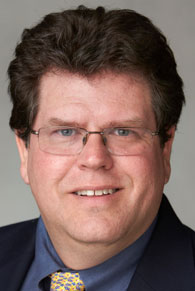The rise of extremist populism in the world’s established democracies, especially in Europe, will be the focus of a Lawrence University Povolny Lecture Series in International Studies address.

Christian Jensen, assistant professor of political science at the University of Nevada, Las Vegas, presents “Shedding Light More Light on Post-Cold War Populism, its Consequences and Institutional Context” Monday, April 9 at 7:30 p.m. in the Wriston Art Center auditorium. The event is free and open to the public.
Jensen will frame his remarks around three people with connections to Lawrence: former President Nathan Pusey and two former government professors, Mojmir Povolny and William Riker.
In the decades since the end of the Cold Ward, a wave of populism has swept both over both sides of the Atlantic, although Jensen says populism’s appeal in wealthy, industrialized democracies is inconsistent. It varies significantly from country to country in both its electoral success and the political consequences of that success.
While the rise populist extremism in Europe may be alarming, Jensen says it’s not new. He argues that institutions governing elections and government formation significantly constrain the prospects for extremist parties and those institutions perform best in their roles limiting extremism when principled leaders take stands against populism.
A 1992 Lawrence graduate, Jensen is a scholar of democratic institutions and political parties, with particular expertise on the politics of the European Union. He joined the political science department at UNLV in 2012 after seven years teaching at the University of Iowa. He also has spent time in Germany as a visiting scholar at the University of Mannheim and the University of Duisburg-Essen.
He earned a master’s degree at American University and a Ph.D. at UCLA.
Jensen’s appearance is part of the Povolny Lecture Series in International Studies. The Povolny Lecture Series, named in honor of long-time Lawrence government professor Mojmir Povolny, promotes interest and discussion on issues of moral significance and ethical dimensions
About Lawrence University
Founded in 1847, Lawrence University uniquely integrates a college of liberal arts and sciences with a nationally recognized conservatory of music, both devoted exclusively to undergraduate education. It was selected for inclusion in the book “Colleges That Change Lives: 40 Schools That Will Change the Way You Think About College.” Engaged learning, the development of multiple interests and community outreach are central to the Lawrence experience. Lawrence draws its 1,500 students from nearly every state and more than 50 countries.